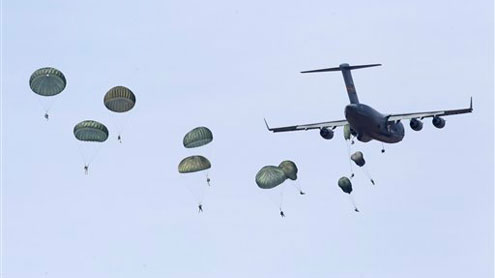American and European-led air strikes shook much of Libya Sunday, as allied attempts shifted from solely impeding Col. Moammar Gadhafi and his loyal forces from gaining airspace to wiping out his control of the ground as well, according to allied officials.
Consequently, by aiding Libyan rebels with numerous air strikes, the United States and its allies have committed to join the fight in the war stricken country, as the unorganized rebel forces continue to battle against their dictator.
Karl DeRouen, a professor of international relations, said coalition actions such as those taking place in Libya are very complicated.
“It is difficult to reach a consensus within the group on what the tactics and goals should be,” DeRouen said. “Even within the EU there is disagreement. Germany abstained on the UN vote to authorize force, for example. The coalition must decide whether it is protecting civilians or attempting to remove Gadhafi from power. International support will be easier to maintain if the goal is simply protecting civilians. Regime change is a bolder move, and one that many states may not be willing to support.”
In an address to the nation on March 18, President Obama said the United States and its allies placed sanctions on Gadhafi, yet he chose to ignore the will of his people and the international community.
“Here is why this matters to us,” Obama said. “Left unchecked, we have every reason to believe that Gadhafi would commit atrocities against his people. Many thousands could die. A humanitarian crisis would ensue. The entire region could be destabilized, endangering many of our allies and partners. The Libyan calls for help would go unanswered. The democratic values that we stand for would be overrun. Moreover, the words of the international community would be rendered hollow.”
Obama continued, saying he wanted to make what the U.S. would and wouldn’t be doing in Libya.
“The United States is not going to deploy ground troops into Libya,” he said. “And we are not going to use force to go beyond a well-defined goal— specifically, the protection of civilians in Libya.”
Lisa Dorr, associate professor and director of graduate studies in the University’s department of history, said she is glad this endeavor is not something the United States is doing unilaterally, because that seems to get the U.S. into trouble.
“That this is a larger effort by the global community is good,” Dorr said. “The problem, though, is that it is always difficult to determine policy by committee. It simply takes longer to go through the process of decision-making, determining the goals and the limits of action. I worry that the length of time it took the UN to come to a decision to enforce a no-fly zone over Libya allowed the momentum of the protest movement to dissipate.
“A few weeks ago, the events in Libya were more closely tied to the revolutions in Tunisia and Egypt. But now the conflict in Libya has evolved to a full-scale civil war, in large part because of Gadhafi’s decision to use violence, as well as because of his support in the military. I don’t think there will be a neat and tidy revolution in Libya in the way there was in Egypt. And in Egypt, really, only the overthrow was neat and tidy—I think the rebuilding of the government might still get very messy. It looks like it will be a more violent, on-going civil war.”
David Macdonald, a junior majoring in telecommunication and film, said he thought what was happening in Libya is important for UA students to follow.
“What occurs there could affect our country as well as our allies nearby,” he said. “We need to take interest in what is happening in other regions.”








